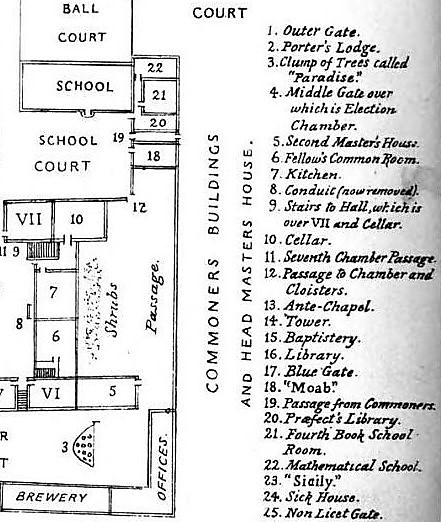
detail from the plan of the College of St Mary of Winchester
from School-Life at Winchester College (1866), by Robert Blachford Mansfield
(“Moab”: number 18)
In the Book of Psalms, 60:8 and 108:9, David compares the subjugated nation of Moab to a vessel used for washing the feet:
Psalm 60 (King James Version – 1611)
6 God hath spoken in his holinesse, I will reioyce: I will diuide Shechem, and mete out the valley of Succoth.
7 Gilead, is mine, and Manasseh is mine; Ephraim also is the strength of mine head; Judah is my Lawgiuer;
8 Moab is my wash-pot; ouer Edom will I cast out my shooe: Philistia, triumph thou because of me.
This gave rise to the humorous application of the noun Moab to a kind of hat shaped like a turban. In The Slang Dictionary; or, The vulgar words, street phrases, and “fast” expressions of high and low society. Many with their etymology, and a few with their history traced (1864), the English publisher and author John Camden Hotten (1832-73) explained:
MOAB, a name applied to the turban-shaped hat fashionable among ladies, and ladylike swells of the other sex, in 1858-9. From the Scripture phrase, “Moab is my WASHPOT” (Ps. lx. 8,) which article the hat in question is supposed to resemble.—University.
And, chiefly in English public schools, Moab denotes a tub, trough or other container for water and a washroom. It originally designated an outdoor conduit for washing. In Etoniana Ancient and Modern: Being notes of the history and traditions of Eton College (1865), William Lucas Collins (1815-87), Church of England clergyman and author, explained that the internal economy and daily life of the college was recorded in Consuetudinarium Vetus Scholæ Etonensis about 1560; this manuscript
gives in full detail the work for each day in the week, with the annual holidays and customs of the school. The old Winchester¹ system was still in full operation, and many of the regulations are identical with those of the mother college at the same date. Like Wykeham’s scholars, the Eton boys rose at five, said their Latin prayers antiphonally while dressing, then made their own beds and swept out their chambers. Two by two they then “went down” to wash, probably at some outdoor conduit or fountain like the old Winchester “Moab.”
(¹ King Henry VI took Winchester College as his model when he founded Eton College in 1440.)
In School-Life at Winchester College (1866), Robert Blachford Mansfield (1824-1908), author and sportsman, describes “some of the more important changes that have taken place in the institutions of the College since the time when [he] was first admitted”:
On the west side of School court a spacious room, nicknamed “Moab,” has been erected, with numerous marble basins, and an unlimited supply of fresh water, and surrounded with lockers for holding cricket and football dresses.
And, in Public School Slang (1940), Morris Marples wrote:
Moab, a receptacle (e.g. a sink, a tub) for dirty plates: Haileybury².
(² Haileybury and Imperial Service College, near Hertford)
In The Fate of the Anglican Clergy: A Sociological Study (1979), Robert C. Towler and Anthony P. M. Coxon describe the characteristics shared by many theological colleges:
The first is a peculiar institutional slang. Perhaps the most common piece of theological college argot is the word ‘topos³’ to refer to lavatories, but in one or more of the colleges other terms enjoyed wide currency in the 1960s, such as ‘Moab’ (wash-place), ‘spike’ and ‘spikey’ (High Church, addicted to ceremonial excess), ‘prot’ and ‘protty’ (Low Church), ‘tat’ and ‘tatty’ (ecclesiastical paraphernalia, objets réligieuses [sic], fondness of same), ‘crud’ and ‘gungey’ (second-rate, inferior, spoiled).
(³ The Greek noun τόπος (= topos) means a place.)
